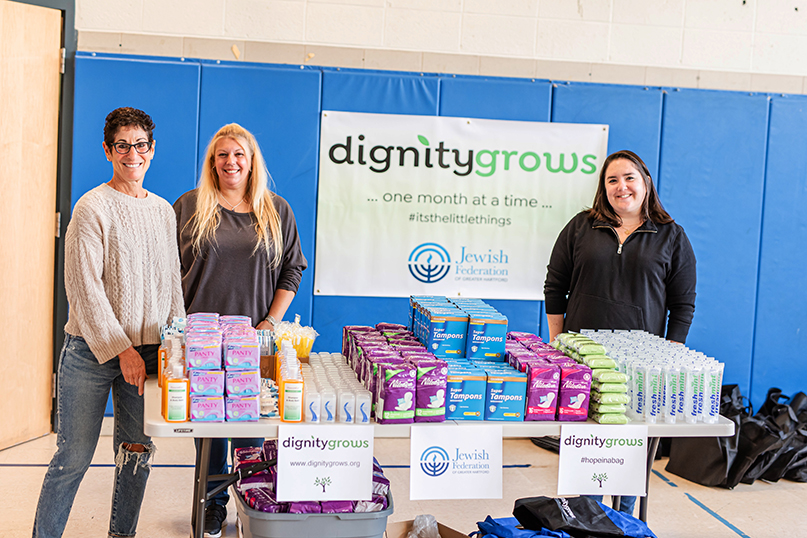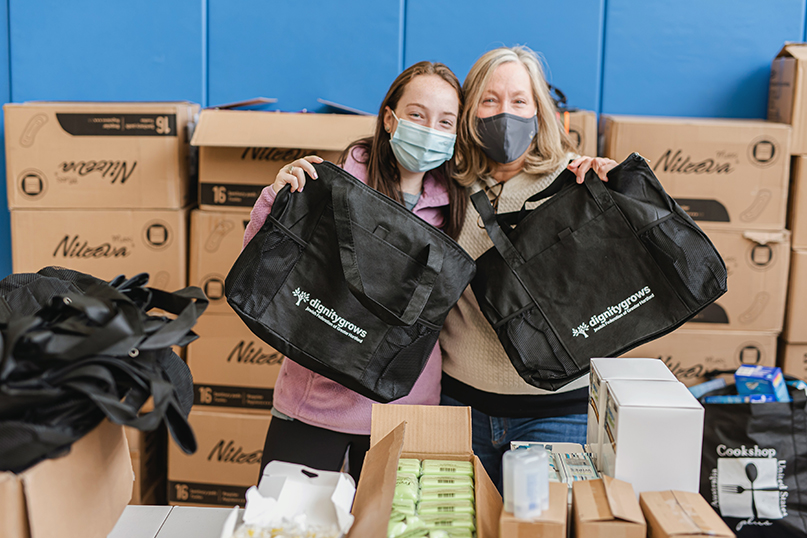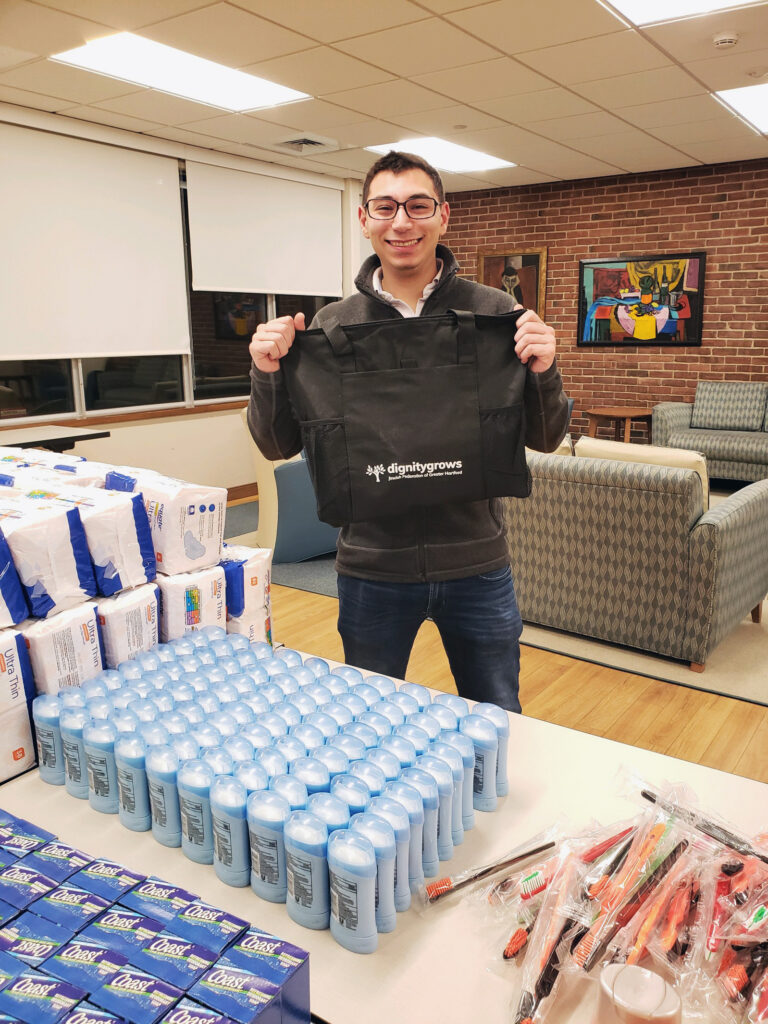
Two CT women launch a grassroots initiative that brings good hygiene — and healthy self-esteem — to girls & women in need
By Stacey Dresner
WEST HARTFORD – When Jessica Zachs of West Hartford watched the 2018 documentary “Period. End of Sentence” about women in India with no access to monthly menstrual supplies, she was shocked.
“These women in India, literally, were still in the’ Red Tent,’” Zachs says, referring to the tent where women in biblical times were sent during menstruation and childbirth.
“I started Googling and found out in very short order that in America [due to] ‘Period poverty’ – which is a recognized term – 20 percent of women can’t afford personal feminine hygiene products,” Zachs says.
“My reaction was, ‘This is wrong…This just can’t be!’”
Feeling that something had to be done, Zachs, a member of Jewish Federation of Greater Hartford’s Women’s Philanthropy, and fellow Women’s Philanthropy member Linda Levin, founded Dignity Grows, an innovative non-profit effort to provide monthly personal and menstrual hygiene products to women and girls who cannot afford them.
Since its inception some 18 months ago, Dignity Grows has distributed Dignity Totes – filled with menstrual and hygiene products assembled by an army of volunteers – to 14 “Distribution Partners” in the Greater Hartford area, all of them local non-profit organizations. The Distribution Partners, in turn, disseminate the totes to those in need among their constituents.
Earlier this month, after mother-daughter teams of volunteers packed 1,500 totes at socially-distanced packing parties held at Solomon Schechter Day School of Greater Hartford, the number of Dignity Grows totes that have been packed and distributed has grown to 5,000.
Now the effort has the potential to grow even more, given the national launch of Dignity Grows on Wednesday, Oct. 28. The expanded initiative includes the debut of a new website, www.dignitygrows.org, designed to inspire Women’s Philanthropy divisions of Jewish Federations around the country to start their own Dignity Grows chapters.

That, says Zachs, would be a giant step towards lessening the toll “period poverty’ takes on the self-esteem and economic and educational well-being of women and girls.
“Most of the women who can’t afford these products are hourly wage workers. If you can’t go to work because you don’t have menstrual supplies, you don’t get paid which heightens the cycle of poverty. So you have to then decide if you’re feeding your kids or if you are buying sanitary products. It’s someone’s economic wellbeing and we know that affects everything else,” says Zachs.
A grassroots effort
In 2019, even before watching “Period. End of Sentence,” Zachs and her friend Linda Levin had been seeking an impactful project for women in the Hartford Jewish community to participate in together.
“And we wanted to get women together to do something – not listen to a speaker, not read a book, but do something that would begin a conversation and awareness about an important issue.”
It was not long after that that Zachs and Levin the documentary, which shed light on the lack of hygiene products in India, and also detailed the inspiring grassroots efforts of a group of Indian women who created and distributed sanitary pads with the help of a local cotton farmer.
“This gentleman in their community said, ‘We’re going to get together and we’re going to start making pads that you women can use,” explains Zachs. “And this gentleman, who was a cotton farmer, got women together; they built machinery and created their own sanitary pads. Then they brought them to markets. People were against them, but this grassroots business took off.”
As did Dignity Grows.
Zachs and Levin grassroots effort began when she met with the Jewish Federation of Greater Hartford to discuss the idea of a one-night program in which women from the community would come together to fill bags with feminine hygiene products for those in need.
“We got a small grant of $1,500 through a donor-advised fund to start. Linda Levin used $1,000 to purchase totes at a buck a piece and we were in business,” Zachs said. “The products, at that point, were donated by the women who came to the event. They were incredibly generous. I think 50 people came to Linda’s house to pack these totes. It was wonderful.”
Making connections
Dignity Grow’s first distribution partners were the Jewish Family Services of Greater Hartford and its Anja Rosenberg Kosher Food Pantry, and Mikveh Bess Israel in West Hartford.
“A committee member who goes to the mikveh said the woman in charge knew women who were in need of these products. So they took about 10 bags,” Zachs says. “In short order, we gave all the bags away, and then everyone said, ‘What about next month?’”
That’s when the women involved knew that the project had to be ongoing.

After months of searching for a strategic purchasing partner, Dignity Grows began a relationship with Dollar Days, a large bulk goods supplier of non-profit and charitable organizations, businesses and schools, from which it began getting all of its products.
Charter Oak Cultural Center in Hartford soon became Dignity Grow’s third distribution partner.
“Jessica and I were just talking and she was telling me about this program,” recalls Rabbi Donna Berman, executive director of Charter Oak Cultural Center in Hartford. “You know, people with some privilege take for granted that everybody can afford [these products] even if they are somewhat expensive, so I thought this was really great.”
Berman hooked up Dignity Grows with Susan Mazer who runs Charter Oaks’s Youth Arts Institute, which serves 1,000 low-income kids.
“We talked to the families and said, ‘If anybody wants to, you can take advantage of this opportunity.’ And there were a lot of people who wanted to. And because we do so much work with homeless people, we asked them as well and they too wanted to take advantage of this great thing,” Berman says. “If you know [these type of necessities] are paid for, your money can go elsewhere–you can buy food, you can buy medicine and you can buy other things. If this is paid for you can use your money for other things that you need. We’ve handed out these bags quite a few times now.”
After Charter Oak, even more people in the community learned about Dignity Grows.
“Before we knew it people were calling us and saying, ‘We hear you have this project. Can we get bags for our clients?’” Zachs said.
In addition to the sanitary pads, the Dignity Grows totes now also always contain shampoo, soap, deodorant, handwipes and toothbrushes and toothpaste. All of the products are full size, giving recipients a month’s supply.
Each bag costs Dignity Grows just $10.
“I think one of the really exciting pieces for me is realizing that Dignity Grows isn’t just the name of the program, it’s really the vision of the program. It’s not just getting the supplies to people who need them, it’s also the way in which they’re delivered,” says Jennifer Schwartzman, director of community connections for Federation and director of operations for Dignity Grows. “We don’t give anything that is unwrapped. We don’t give leftovers from hotels. We do that to respect the dignity of the recipients. They should be able to carry the bag that looks just like a school bag or a workbag, and that there should be no stigma attached to receiving the product either.”
Each Dignity Grows chapter connects with Distribution Partners in its own community. In Hartford, Dignity Grows has 14 local Distribution Partners, including Asnuntuck Community College Food Pantry, Boys & Girls Clubs of Hartford, Brownstone Clinic at Hartford Hospital; COMPASS Youth Collaborative; the Connecticut Women’s Education and Legal Fund; Grace Lutheran Church Food Line; Hartford Gay & Lesbian Health Collective; Hartford Public Library; Hartford Public Schools; and Manchester Community College Food Pantry.
“Poverty is like quicksand,” says Berman, “because when you’re not able to get simple things that we take for granted – like the items in this bag: sanitary napkins, toothpaste, deodorant – it becomes hard to get a job. These fundamental things are the basis upon which we build the rest of our lives. For those of us who can afford it, we may complain about how expensive it is, but still we can buy it. For people who don’t have the money [to purchase these items], it can really undermine their getting ahead in the world. It’s very significant and it can have a tremendous impact on the quality of somebody’s life.”
Going national
Zachs, who sits on the National Women’s Philanthropy Board of the Jewish Federations of North America’s (JFNA), was asked by to present Dignity Grows as a ‘best practice’ at the organization’s annual board retreat in June 2018.
“At the time, they had just really launched this initiative in Hartford,” says Jenna Corman Mandel, associate vice president of JFNA’s National Women’s Philanthropy. “When Jessica spoke about the program, you could see in the women’s faces and reactions just how much it immediately resonated, because everyone sitting there could put themselves in that position and know just how different their lives would be, how there lives would be altered by this level of poverty.”
This summer, after speaking with Zachs further, JFNA endorsed Dignity Grows and prepared to help launch it nationally.
“We hired a branding agency and a web designer, and we have an educational video,” reports Zachs. “We’ve also put together an amazing website that [JFNA] has seen and approved of, and they are fully endorsing this. They are the launch pad for our chapter.”
A national coordinator, Jessica Slater, has also been hired.
“I think other communities should benefit from what Hartford has learned,” says Slater. Jessica and Jennifer have done such a great job of reaching, not just the Jewish community, but many members of the greater Hartford community. The other Federations in the state of Connecticut are starting to do the same thing and lots of different communities will have that opportunity, so I think it’s going to be fantastic.”
In fact, using the Hartford model, the Greenwich Federation launched the program in their community last winter.
While Dignity Grows is a program of the Jewish Federation of Greater Hartford, it does not receive Federation funds.
According to Zachs, the goal is for Dignity Grows to become a 501©3 organization and for new chapters to do their own fundraising. In Hartford, those who want to contribute money to Dignity Grows can make a local donation on their website. Hartford has also been hard at work seeking grants; a grant from Bank of America recently paid for 750 totes for Hartford public school students.
“The real beauty of this is that it is such a low barrier program in terms of investment,” says Corman Mandel. “In Hartford, it’s just $10 a bag. So you can really be fundraising from all different kinds of people and at all kinds of different giving levels. It’s not a major investment and, in addition, you can choose to also be hands-on by taking part in the packing of the bags. It’s a real engagement opportunity.”
According to Corman Mandel, following Jessica Zachs’ presentation at the National Women’s Philanthropy annual retreat last year, some of the women went back to their communities and coordinated a one-off Dignity Grows program. Others are interested in beginning an ongoing program like Hartford’s chapter.
“We began to see it start to spread a bit organically throughout the country,” Corman Mandel says. “The combination of that and of Jessica launching this sort of umbrella organization that gives people the tools to launch it in local communities – making it a turn-key operation of sorts – the more we felt that National Philanthropy could really help push it out and give Jessica that support.
“We’re not in a position to take it national. But what we’re in a position to do is share it nationally with local professionals and encourage them to launch it,” says Corman Mandel.
“JFNA has been so wonderfully supportive in endorsing it,” Zachs said. “Their enthusiasm has been overwhelming.”
On Oct. 28, JFNA invited its community organizations to a Zoom presentation at which Zachs and her team discussed Dignity Grows and unveiled the program’s new Dignity Grows website, which includes information on the project, as well as guidance on how to launch a new chapter. a
“[JFNA is] obviously happy to support Dignity Grows in whatever way we can,” says Corman Mandel. Of course, she adds, “Jessica now has her own team, so I think that more than anything we’re the cheerleaders and sort of the hechsher (the stamp of approval) for the program, because we really have witnessed its success. There are so many positives to this program and we really just wanted to help encourage communities to take it on.”
Says Schwartzman: “This is a chance to really live up to our values. We can talk about our place as Jews and the world around us, but this is such a simple way to just live it, and really bring it to action.”
To find out more about Dignity Grows, or to start a chapter or make a donation visit www.dignitygrows.org.
Local donations may also be made at jewish hartford.org/dignity-grows-donations.
Main Photo: The Dignity Grows Team (l to r) Jessica Zachs, Jennifer Tolman Schwartzman and Jessica Slater.







 Southern New England Jewish Ledger
Southern New England Jewish Ledger















